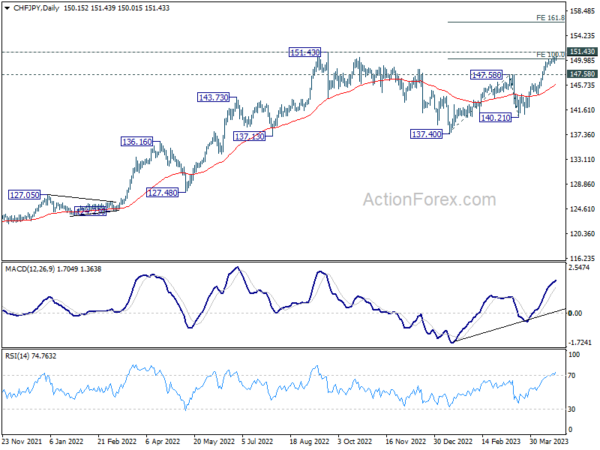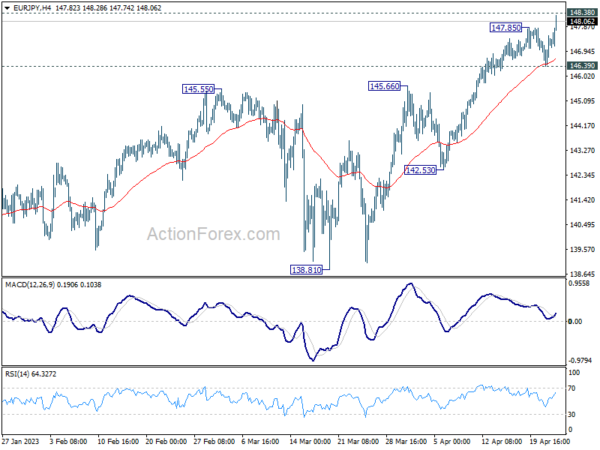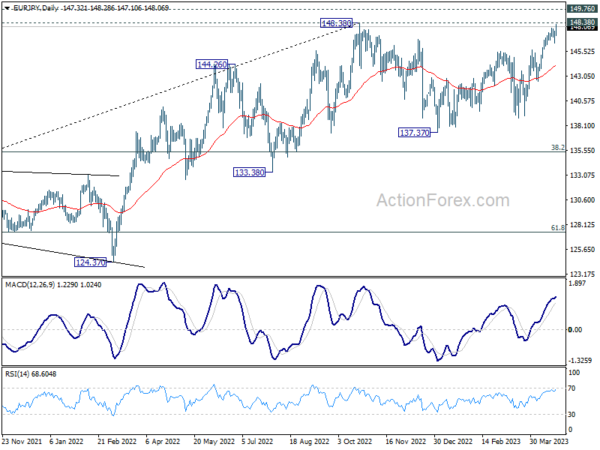Japanese Yen suffers broad sell-off today, following comments from BoJ Governor Kazuo Ueda that seem to have quashed hopes of even a minor shift in monetary policy this week. Meanwhile, overall market sentiment remains steady, with Australian and Canadian Dollars also facing selling pressure. On the other hand, European majors are showing strength for the day, buoyed by optimism surrounding an improvement in economic momentum in the second quarter. Swiss Franc is currently outperforming Euro and Sterling, while Dollar remains mixed but vulnerable to a sell-off against European currencies.
From a technical perspective, CHF/JPY appears poised to resume its long-term uptrend through 151.43 high with strong momentum. Sustained trading above this level could pave the way to 161.8% projection of 137.40 to 147.58 from 140.21 at 156.68. A question now is when EUR/JPY will break through 148.38 resistance level to resume its long-term uptrend as well.
In Europe, at the time of writing, FTSE is down -0.13%. DAX is up 0.08%. CAC is down -0.08%. Germany 10-year yield is up 0.006 at 2.489. Earlier in Asia, Nikkei rose 0.10%. Hong Kong HSI dropped -0.58%. China Shanghai SSE dropped -0.78%. Singapore Strait Times rose 0.08%. Japan 10-year JGB yield rose 0.0099 to 0.472.
Germany Ifo rose to 93.6, worries abating, but lacks dynamism
Germany Ifo Business Climate rose slightly from 93.2 to 93.6 in April, below expectation of 94.0. Current Assessment index dropped from 95.4 to 95.0, below expectation of 96.1. Expectations index rose from 91.0 to 92.2, above expectation of 91.6.
By sector, manufacturing rose from 6.5 to 6.7. Services dropped from 8.8 to 6.8. Trade dropped from -10.1 to -10.7. Construction rose from -17.5 to -16.7.
Ifo said: “German business’s worries are abating, but the economy is still lacking dynamism.
Bundesbank: Inflation to remain high overall in coming months
In its latest monthly report, Bundesbank revealed that German economy performed better than anticipated in the first quarter of 2023. Despite persistently high inflation negatively impacting private consumption, industry experienced a stronger recovery. Additionally, goods exports saw a sharp increase, and construction industry temporarily boosted production. Improved economic performance during the winter months was also reflected in the labor market. Early indicators suggest further positive developments ahead.
Inflation rate fell notably to 7.8% in March, a 1.5 percentage point decrease from February. Bundesbank attributes this decline to a base effect. However, core inflation rate, excluding energy and food, climbed by 0.5 percentage points to reach a historic high of 5.9%. In the coming months, Bundesbank expects inflation rate to continue falling somewhat, particularly due to decreasing energy prices and a potential gradual easing in prices of food, other goods, and services. However, underlying price pressure is expected to remain high overall in the coming months.
BoJ Ueda highlights importance of strong inflation projections in monetary policy decisions
BoJ Governor Kazuo Ueda emphasized today that the central bank’s inflation forecasts must be “quite strong and close to 2%” within the coming year for the bank to consider adjusting its yield curve control policy.
Speaking to parliament, Ueda said that as “trend inflation is below 2%,” BoJ must maintain its current monetary easing stance. However, he noted that when trend inflation is projected to reach 2% target, the central bank must normalize monetary policy.
When asked about the specifics of how BoJ might phase out YCC, Ueda opted not to provide explicit details, clarifying that such a decision would hinge on a variety of factors, encompassing the economy, inflation pace, and other elements at the time of the verdict.
“At this moment, I cannot provide a definitive answer regarding how this could be executed,” he said, touching upon BoJ’s exit strategy. Nonetheless, Ueda reassured that ” BOJ has actively been conducting numerous evaluations on the potential impact of a monetary policy normalization on its financial situation.”
EUR/JPY Daily Outlook
Daily Pivots: (S1) 146.68; (P) 147.12; (R1) 147.84; More….
EUR/JPY’s rally resumed by breaking through 147.85 and intraday bias is back on the upside. Decisive break of 148.38 will resume larger up trend to 149.75 long term resistance. For now, outlook will remain bullish as long as 146.39 support holds, in case of retreat.
In the bigger picture, as long as 55 W EMA (now at 140.44) holds, larger up trend from 114.42 (2020 low) is still in progress for 149.76 long term resistance. Decisive break there will resume long term up trend. However, sustained break of 55 W EMA will bring deeper fall to 38.2% retracement of 114.42 to 148.38 at 135.40.
Economic Indicators Update
| GMT | Ccy | Events | Actual | Forecast | Previous | Revised |
|---|---|---|---|---|---|---|
| 08:00 | EUR | Germany IFO Business Climate Apr | 93.6 | 94 | 93.3 | 93.2 |
| 08:00 | EUR | Germany IFO Current Assessment Apr | 95 | 96.1 | 95.4 | |
| 08:00 | EUR | Germany IFO Expectations Apr | 92.2 | 91.6 | 91.2 | 91 |
| 12:30 | CAD | New Housing Price Index M/M Mar | 0.00% | 0.10% | -0.20% |



